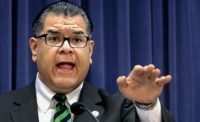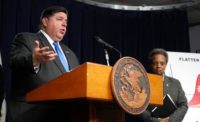The Wisconsin Supreme Court has ruled 4-3 that Gov. Tony Evers' [D] extension of the state's stay-at-home order is unconstitutional. The court deemed it "unlawful" and "unenforceable" after the state's Republican-controlled legislature filed a lawsuit in April questioning its legality.
[For ENR’s latest coverage of the impacts of the COVID-19 pandemic, click here]
The court also said Evers' administration overstepped its authority when the state's Dept. of Health Services extended the order to May 26 from its original expiration date of April 24.
Republican legislative leaders Robin Vos [state assembly speaker] and Scott Fitzgerald [senate majority leader] argued in the lawsuit that the order would cost Wisconsin residents jobs and hurt many companies, asserting that if it were left in place, "our state will be in shambles."
"When we met with Gov. Evers [in April], we asked him to begin negotiating with us on a plan for reopening," Vos and Fitzgerald said in a statement. "He politely declined and said we should wait for the court decision. Now that the decision has been rendered, we are confident Wisconsin citizens are up to the task of fighting the virus as we enter a new phase."
Many businesses, such as bars and restaurants, immediately reopened following the ruling, but some municipalities and counties have instituted their own stay-at-home orders, including Milwaukee County and the 18 municipalities that surround it.
"Up until now, Wisconsin was in a pretty good place in our battle against COVID-19. We had reached almost all our gating criteria. We had opened up 14,000 small businesses across the state, putting 90,000 folks back to work, and that was because of the good work of Wisconsinites across our state who banded together, stayed home and stayed safe," Evers said in a statement.
Some Work Halted By Economic Uncertainty
Construction projects have largely continued throughout the state because construction was already exempted from the statewide order as essential infrastructure.
But what Wisconsin contractors have seen is cancellation and postponement of projects due to the uncertain economic environment created by the COVID-19 pandemic, according to the Associated General Contractors of Wisconsin, which surveyed 54 member-contractors in the state in late March and April. The health care and retail sectors saw the most cancellations, according to the survey.
"The big number that came out of that survey was that 89% of our contractors have experienced the postponement or cancellation of a project," said Bob Barker, executive vice president of the AGC of Wisconsin. "It's going to be interesting to see how this plays out [after the ruling]; there are a lot of cautious people still in the industry and just how all of this affects our industry."
Barker said that what Republicans in the state legislature were advocating was a more regional approach, one that treats sparsely populated areas with fewer cases of the novel coronavirus, mainly in northern Wisconsin, differently than the major population centers in the southern part of the state, including Madison, Milwaukee, Green Bay and Kenosha.
According to the ruling, Evers could approach legislative leaders and negotiate an extension of the existing order, or the state legislature could pass a law authorizing a new order with the administration's input. The AGC of Wisconsin said 44% of contractors surveyed reported layoffs of field workers and 22% cited furloughs or layoffs of either administrative or project management staff due to the pandemic.
Uncertainty about the Dept. of the Treasury's Paycheck Protection Program also has been a factor for Wisconsin contractors.
"Right now there's simply a lot of uncertainty for our members, and they need some guidance on that [PPP]," Barker says. "There's a misunderstanding about how contractors operate and how lines of credit are required by federal-bonding regulations. The program has definitely benefited our members, and we haven't seen a huge impact on the industry here. The big question is how it will impact members in the fall."
Barker advised both legislative leaders and the Evers administration to consult with design and construction professionals on how to deal with continuing work and how to reopen other industries for safe operation when a plan is agreed to.
"The design and construction industry can be a great help in this time," he said. "We're really proud of how our members and craft workers have responded and been able to work through it, and I think we'll start seeing more positive news as testing expands. Our members are going to continue to be diligent in their safety practices no matter what."





